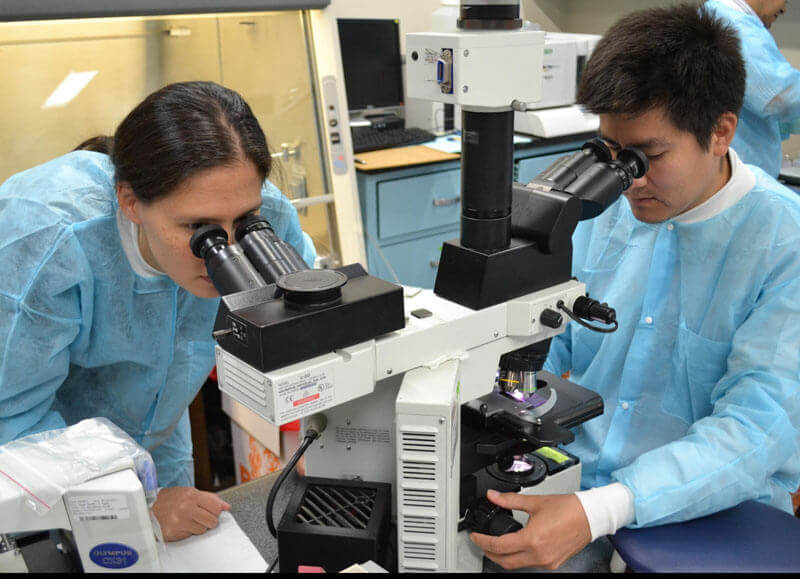Courtney CarsonGHTC
Courtney Carson is a policy and advocacy officer at GHTC, who leads GHTC's US advocacy portfolio.
 US Navy Lt. Kimberly Edgel, left, and Christian Baldeviano examine a positive malaria blood smear at Naval Medical Research Unit (NAMRU) 6 in Callao, Peru.This afternoon, the US Senate voted to protect critical medical research programs at the Department of Defense (DoD). In a vote of 66 to 32, the Senate
approved Senator Durbin’s (D-IL) Amendment 4369 to the Fiscal Year 2017 National Defense Authorization Act (FY17 NDAA), which strikes sections 898
and 756 in the underlying bill, designed to enact enough restrictions and red tape on DoD medical research to effectively end all existing programs.
With this vote, the majority of the Senate signified that medical research is a critical function of the DoD, and must continue to be a priority.
US Navy Lt. Kimberly Edgel, left, and Christian Baldeviano examine a positive malaria blood smear at Naval Medical Research Unit (NAMRU) 6 in Callao, Peru.This afternoon, the US Senate voted to protect critical medical research programs at the Department of Defense (DoD). In a vote of 66 to 32, the Senate
approved Senator Durbin’s (D-IL) Amendment 4369 to the Fiscal Year 2017 National Defense Authorization Act (FY17 NDAA), which strikes sections 898
and 756 in the underlying bill, designed to enact enough restrictions and red tape on DoD medical research to effectively end all existing programs.
With this vote, the majority of the Senate signified that medical research is a critical function of the DoD, and must continue to be a priority.
Infectious disease and other medical research at DoD plays a vital role in serving the Department’s overarching mission: supporting our military men and women. Not only does DoD infectious disease research directly benefit service members overseas—who experience neglected infectious diseases alongside local communities—but it also plays a key role in domestic health preparedness initiatives that prevent, detect, and respond to infectious diseases that threaten the health of American civilians at home. Beyond threat reduction to Americans, DoD research can often be translated for other contexts, and serves as an important component of US global health efforts to address HIV and AIDS, tuberculosis, malaria, and neglected tropical diseases in low-income countries.
For example, malaria, which threatens the lives of nearly 3.2 billion people in tropical and poor regions of the world, is also a significant threat to the operational readiness of the US military. More person-days were lost among US military personnel due to malaria than to bullets during every military campaign fought in malaria-endemic regions during the 20th century. Thanks to ongoing research at DoD, nearly all of the most effective and widely used antimalarials—used to protect our service members overseas and adapted for widespread use in endemic regions—were developed in part by US military researchers. DoD medical research is also critical to medical advances that directly benefit US civilians at home: One of every four vaccines approved by the US Food and Drug Administration in the last century was developed with the participation of DoD. The 2014 Ebola epidemic in West Africa offers yet another example: the Department’s quick work to advance the development of Ebola countermeasures and safety protocols during troop deployment to West Africa was vital to protecting lives of service members and civilians in the region and remains vital to ongoing response efforts.
On May 25th, GHTC sent a letter to members of the Senate, urging them to uphold the DoD’s critical medical research programs and oppose provisions in Sections 756 and 898 of the FY17 NDAA, which would limit our nation’s ability to develop medical countermeasures necessary to protect our troops and save lives around the world.
GHTC commends Senator Durbin’s leadership on a bipartisan effort to remove these troubling provisions and extend our thanks to the co-sponsors of Amendment 4369: Cochran (R-MS), Reid (D-NV), Blunt (R-MO), Mikulski (R-AK), Murkowski (D-MD), Murray (D-WA), Collins (R-ME), Feinstein (D-CA), Shelby (R-AL), Casey (D-PA), Gillibrand (D-NY), Baldwin (D-WI), Bennet (D-CO), Markey (D-MA), Brown (D-OH), Leahy (D-VT), Hirono (D-HI), Reed (D-RI), Menendez (D-NJ), Tester (D-MT), Coons (D-DE), Kirk (R-IL), Klobuchar (D-MN), Udall (D-NM), Boxer (D-CA), Schatz (D-HI), Moran (R-KS), Sanders (D-VT), Warren (D-MA), Cardin (D-MD), Schumer (D-NY).